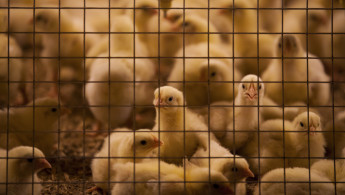Jordanians boycott poultry, eggs after government chickens out on price controls
A boycott of chicken and eggs has been launched in Jordan amid calls on the government by campaigners to cap rising prices.
A watchdog accused Jordan's government of favouring farmers and traders over consumers after it removed a cap on prices earlier this month, citing a rise in the cost of chicken feed.
The National Society for Consumer Protection (NSCP) urged citizens to join in the boycott and the Arabic-language hashtag #Chicken_Boycott has been trending on social media in recent days, The New Arab's Arabic sister site Al-Araby Al-Jadeed reported on Friday.
NSCP chief Mohammed Obeidat said large farm owners and traders "want to cancel the current price ceilings or set ceilings higher than they are".
The consumer rights group also called on shops to join the boycott.
A government price ceiling set in March had capped the price at between 1.65 and 2 dinars ($2.33–2.82) per kilogram. Chicken meat now costs around $3.50 per kilogram.
The NSCP said producers reacted to the price cap by reducing the supply of eggs and poultry to the market, to force the government to U-turn on the prices it had set.
But industry ministry official Emad Al-Bazour said there would be an intervention if there are confirmed unjustified price rises.
The ministry looks to avoid such price hikes while also considering rising production costs, he added.
Egypt's urban inflation increased to 10.5 percent in March as residents struggle with the cost of livinghttps://t.co/XpsEDzdwwW
— The New Arab (@The_NewArab) April 10, 2022
Jordan's domestic chicken consumption is estimated at about 700,000 chickens per day, while producers can cover 130 percent of this, meaning there is a surplus, according to government officials.
Agriculture ministry spokesperson Lawrence Al-Majali said Jordan produces enough domestically and that the door is open to imports.
It comes as the kingdom imported an estimated 85 percent of overall food from overseas due to local production shortages, according to figures from a local industry union.
The Jordanian government has taken several measures to deal with price increases, including reducing inspection costs for imported goods by 30 percent.





 Follow the Middle East's top stories in English at The New Arab on Google News
Follow the Middle East's top stories in English at The New Arab on Google News
![The UAE is widely suspected of arming the RSF militia [Getty]](/sites/default/files/styles/image_330x185/public/2024-11/GettyImages-472529908.jpg?h=69f2b9d0&itok=Yauw3YTG)
![Netanyahu furiously denounced the ICC [Getty]](/sites/default/files/styles/image_330x185/public/2024-11/GettyImages-2169352575.jpg?h=199d8c1f&itok=-vRiruf5)
![Both Hamas and the Palestinian Authority welcomed the ICC arrest warrants [Getty]](/sites/default/files/styles/image_330x185/public/2024-11/GettyImages-2178351173.jpg?h=199d8c1f&itok=TV858iVg)